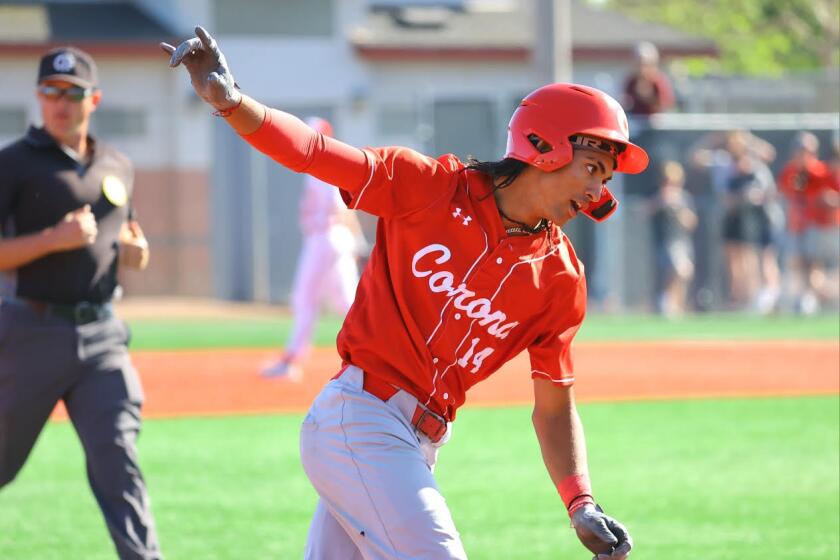For Being Unprofessional, She Gained an Exclusive Reward
- Share via
As a lifelong fan of athletes and the games they play, it is often difficult for me to separate my work as a reporter from my fascination as a spectator and my emotions as a human being.
Many sportswriters will tell you that they never get emotionally involved. Professionals should remain objective, they say.
Well, truth be told, I am not one of those professionals--not yet anyway.
I am probably too much a fan of sports and the drama that surrounds the games.
Often, I feel myself pulling for the underdog, or perhaps the young athlete who has overcome a heart-wrenching obstacle. And sometimes I just plain like a kid--for whatever reason--and want him or her to succeed.
Such was the case one evening in March as I watched the boys’ basketball teams from Monroe and Banning highs play for the City Section 3-A Division championship. On this night at the Sports Arena, I was on assignment.
My heart, however, accompanied me to the game and it was tugging for Monroe, a team enjoying a Cinderella season with a 23-3 record.
Banning dominated at the outset of the game.
All season I had told two of my basketball-loving colleagues how exciting Monroe’s transition game was--replete with thrilling alley-oop dunks, eye-popping no-look passes and breathtaking one-handed jams.
Imagine then my embarrassment in front of those two co-workers--who came only to watch--when late in the first quarter the scoreboard showed: Banning 14, Monroe 0.
However, as I sat at the press table trying in vain to wipe the egg off my face, Monroe rallied.
Junior forward Kenyatta Niles caught fire and scored 12 of his team’s 17 second-quarter points and the Vikings cut the lead to 32-24 at halftime.
It pleased me that Niles was leading the Vikings’ charge.
I had gotten to know him well during the season, discovering an friendly and considerate young man. I also became acquainted with his mother, Allison, who keeps Monroe’s score book and who knows more about basketball than the average father.
It was not difficult for me to like Kenyatta Niles, so it stood to reason I was unprofessionally pulling for him and the Vikings when his free throw brought Monroe to within one point with 25 seconds remaining. Niles was preparing for his second shot.
And about to unfold was probably the longest 25 seconds of his athletic life.
Niles, who had made six of his seven previous free throws, missed the chance to tie the score when his second shot fell short with 25 seconds left.
I remember thinking, What a bummer. I’ll bet he’d like another chance at that shot.
As if by magic, Niles was fouled and was back at the free-throw line for another one-and-one with 13 seconds left.
But his shot bounced in and out of the basket and Banning’s Bryan Hill was fouled on the rebound.
My heart went out for my friend and his missed opportunities.
Hill also missed on his free-throw attempt and Monroe’s Marco Rich grabbed the rebound. Rich pushed the ball upcourt and fed Niles for one last try.
Niles, fearful that time would run out before he could get closer, pulled up for a three-point shot from the right side with four seconds left.
But that one also missed, bouncing off the back of the rim and into the hands of Banning’s Chris Shealy.
The game was over. And so was my agonizing roller-coaster ride.
Niles took a seat at the end of his team’s bench, cradling a towel draped over his head.
Twenty feet away a joyous Banning team was in a dog pile near midcourt.
Several people walked up to Niles and put a consoling hand on his shoulder, but he never flinched. It was as if he hoped to disappear underneath that towel.
He did, however, disappear into the locker room before I could track him down.
Standing outside that locker room, I knew there was no way he was going to talk to all those reporters after what had happened. All too often in high school sports, athletes are so overwhelmed with grief after a big loss, they can’t form words through their tears.
Some male reporters ventured into the locker room after Niles. I, a female reporter, opted to ask for Niles and wait just outside the locker room.
I was a bit surprised when he emerged, then walked past four or five other reporters and headed toward me. When one of the reporters asked him a question, Niles turned and said in a level tone, “I’m out here to talk to Paige. That’s it.”
It was one of the proudest moments of my career. Niles didn’t come out of the locker room to talk to a reporter. He came out to talk to someone who sometimes gets too emotionally involved in the game--and the players who play them.
More to Read
Get our high school sports newsletter
Prep Rally is devoted to the SoCal high school sports experience, bringing you scores, stories and a behind-the-scenes look at what makes prep sports so popular.
You may occasionally receive promotional content from the Los Angeles Times.






